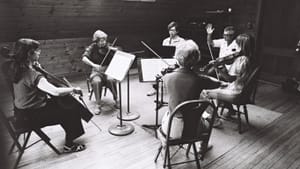Stay in the Loop
BSR publishes on a weekly schedule, with an email newsletter every Wednesday and Thursday morning. There’s no paywall, and subscribing is always free.
American classical music grows up
‘The Music of Friends’ by David W. Webber

Amateurs have been playing chamber music for centuries, but here on the East Coast, the Chamber Music Conference and Composers’ Forum of the East (CMC), founded in Vermont in 1946, gave amateur musicianship a special reverence and became an important piece of American musical life. Now author David W. Webber offers a meticulously researched history in The Music of Friends.
The most striking aspect of Webber’s survey of the past 75 years of this major chamber-music festival is the degree to which this story mirrors the rise of the classical music scene in America. Prior to World War II, Europe was widely recognized as the center of the classical-music universe. American composers were starting to gain recognition, but not with anything like the enthusiasm that greeted the jazz performers of the day and populist composers such as Gershwin.
Encouraging amateurs
Chamber-music playing by talented amateurs enjoys a long tradition. During the Classical period, at the end of the 18th century and sneaking into the beginning of the 19th, the great practitioners of the format, including Mozart, Haydn, and Beethoven, frequently collaborated with nonprofessionals. Everyone was usually accompanied by other indulgences, including (in the recollection of one of Haydn’s partners) “a jolly time drinking rare coffee and smoking tobacco.” Of course, it was no coincidence that many of these amateurs were also royal patrons of the composers.
Amateur chamber-music performance remained a robust practice in Europe and across the Atlantic, where, by the post-Civil War era, every proper household was expected to include a piano. As American musical life began to mature, orchestras, opera companies, and conservatories were established. In 1946, CMC was born on the campus of Middlebury College in Vermont, institutionalizing chamber music as a major element in American musical life.
In the early postwar years, European refugees and émigrés still played a major role in American music, and that was represented at CMC as well. And yet even from the start, CMC stood apart from certain European conventions. Violinist and conductor Alan Carter was the founder, and his earliest ensembles included many women, which was highly unusual at the time. He also encouraged the participation of technically qualified amateurs.
A sweeping vision
CMC is distinguished by the inclusion of contemporary music. The list of composers who appeared at CMC, many as summer-long residents, is extraordinary, including such luminaries as Otto Leuning (described by Webber as the “Godfather of the conference”), Ezra Laderman, Morton Feldman, Ralph Shapey, Edgard Varèse, Stefan Wolpe, and Charles Wuorinen, just to name a notable few. There were also a number of strong Philadelphia connections, such as George Rochberg, who would go on to become one of the most influential composition teachers of his generation from his professorial perch at the University of Pennsylvania; Helen Laird, a transformative dean of the Temple University School of Music; and Bernard Garfield, the long-time principal bassoonist of the Philadelphia Orchestra.
A good deal of the politics and financial struggles of CMC may be of limited interest to the general public, but the many portraits of the parade of characters that populated the events over the years are delectably drawn. Webber, a Philadelphia-based writer (and BSR contributor), is also a bass player, and has himself been a participant at the conference for many years. His elegant and crisply written account captures a significant period of American culture with sweeping vision.
Image description: A black-and-white photo of a music studio shows a string quartet, a clarinetist, and a conductor practicing in a circle under a window.
What, When, Where
The Music of Friends: 75 Years of the Chamber Music Conference and Composers’ Forum of the East. By David W. Webber. Arlington, MA: Chamber Music Conference, August 25, 2020. 313 pages, softcover; $45.99. Get it and support independent booksellers at Bookshop.com.
Sign up for our newsletter
All of the week's new articles, all in one place. Sign up for the free weekly BSR newsletters, and don't miss a conversation.
